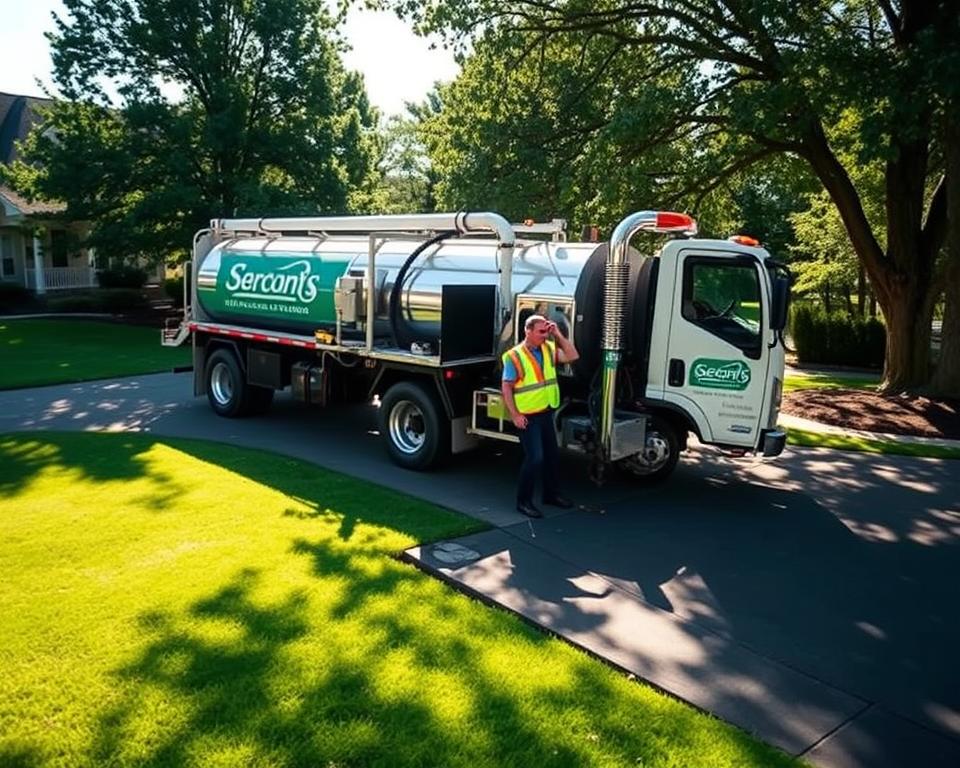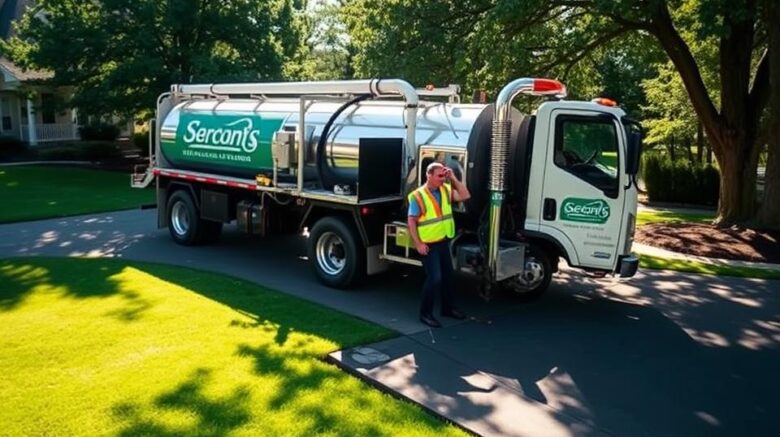Sustain Septic System Cleaning for Tank Health
Ever wondered about the effects of ignoring septic system maintenance? For homeowners relying on these systems for wastewater treatment, foregoing scheduled care can cause substantial bills. It also introduces risks to both health and the ecosystem. Servicing your septic system isn’t just a simple task; it’s crucial for ensuring your home operates smoothly. By regularly clearing out your septic tank, you stop solid waste accumulation and lengthen the service life of your unit. This preventive strategy lets you avoid any troublesome scenarios. Find out the significance of septic tank upkeep and the steps involved with septic tank cleaning service.
Essential Summaries
- Routine septic system pumping is vital for avoiding costly fixes.
- Ignoring upkeep can lead to health risks for your loved ones.
- Understanding your septic system aids in efficient maintenance.
- Indicators of a failing septic system should be noticed quickly.
- Licensed services can help in preserving excellent tank health.
Understanding Your Septic System
A septic system is an efficient on‑property method for processing wastewater. It mainly comprises two components: the septic tank and the drainfield. Both are vital for providing safe treatment and safeguarding the ecosystem.
The septic tank collects wastewater from your home. Inside,, solid particles drop to the floor, and liquids rise to the top. Bacteria within the tank decompose the organics, making the outflow easier to treat. This pre‑treated wastewater then flows to the drainfield for extra cleanup by the ground, finishing the cleanup.
It’s crucial for homeowners to grasp the workings of their septic system. Knowing how the septic tank and leachfield operate as a unit can foster better system care. This understanding encourages proper maintenance practices, ensuring the system’s robustness.

Value of Consistent Septic System Cleaning
Consistent servicing of the septic system is essential for household and environmental health. If ignored, untreated wastewater can seep into your yard. This spillage may result in groundwater contamination, introducing dangerous conditions. By keeping the septic system clean, you safeguard your household and the ecosystem.
It’s recommended to clean the septic system every three to five years, according to how much you rely on it. Such care is not just good for the planet; it avoids costly fixes. A septic system that’s well‑maintained operates more reliably, ensuring a healthier household and a cleaner natural world.
Indicators Your Septic Tank Needs Attention
Homeowners need to recognize signals that their septic tank may need cleaning. Common signals to look out for consist of:
- Sluggish drainage in basins, showers, and loos
- Unpleasant odors near the drainfield
- Effluent overflows in indoor pipes
- Extended soggy spots or extra‑green sections of grass over the septic system
It’s critical to spot these symptoms quickly to avert serious septic tank failures. Regular inspections are key. They help spot issues before they become pricey restorations. Checking your system consistently ensures it works well and endures longer.
Staying alert and responding quickly are key for septic system care. By monitoring these red flags, you can keep your septic system in optimal health.
Septic System Pumping Schedule
Servicing your septic system regularly is key to maintaining your home’s plumbing in top shape. Experts generally advise cleaning the septic tank every 3‑5 years. However, this can change based on the size of your family, how much water you use, and the size of your tank.
If you have a big household that uses more water, you may require to clean the system more frequently. Watching your water consumption can help you figure out if you need to adjust your pumping schedule.
All in Sanitation recommends setting up a steady pumping schedule that fits your household’s particular needs. Sticking to a regular maintenance routine keeps your septic system operating smoothly and avoids expensive restorations.
Septic System Cleaning: Best Practices
For a septic system to keep sound, homeowners must follow crucial habits. It’s vital not to flush non‑degradable materials; doing so stops clogs and maintains the system working well. Similarly, minimizing harsh chemicals helps maintain the essential bacterial population. These actions are critical for the system’s life span and performance.
Being proactive with routine inspections is key. Setting up regular inspections can detect issues promptly, enabling swift fixes. Additionally, reducing water through stopping leaks and mindful usage boosts septic tank health. These measures ensure the system runs efficiently for decades.
It’s also important not to park on the drainfield. Keeping this area unobstructed allows it effectively process liquid waste, safeguarding your system from damage. Following advice from experts like All in Sanitation also boosts septic system care.
The Steps of Septic Tank Pumping
For homeowners, learning the septic system cleaning process is crucial. A licensed septic pumper should handle scheduled septic tank pumping to keep your system functioning efficiently. The first step is assessing the tank’s state to decide when it needs pumping.
A septic tank demands pumping once the sludge occupy about one‑third to one‑half of its space. The licensed septic pumper will then clear out these accumulations. This action keeps the system’s efficiency. Furthermore, the appointment may involve inspecting the tank for possible issues, facilitating immediate fixes.
Maintaining a journal of each pumping visit is wise. This log helps homeowners monitor their septic system’s maintenance, and is useful if selling the property. Proper septic system maintenance boosts its longevity and functionality, heading off expensive fixes in the future.
Septic Tank Inspection: What to Examine
Regular inspections are vital for your septic system’s health. Using a thorough septic tank inspection checklist can uncover latent issues early. Inspections should be carried out by a licensed contractor every one to two years. They will gauge sludge levels and the floating layer during this time.
Examining the baffles and filters is also crucial. These parts are essential for your septic system’s efficient operation. Detecting seepage or issues promptly can prevent high repair costs. Preventive steps, like adhering to an inspection checklist, enhance your system’s durability and performance.
Expert Septic System Services
Using expert septic system services is crucial for your septic system’s integrity. By choosing a company like All in Sanitation, you ensure that experts take care of the pumping, inspections, and fixes thoroughly. Licensed septic professionals possess expertise, helping homeowners to maintain the system’s optimal functionality over the years.
Upkeep by certified technicians cuts the likelihood of sudden breakdowns and expensive fixes. These services include comprehensive inspections that assess the system’s status, pinpointing incipient problems early. Taking this preventive approach significantly lengthens your septic system’s longevity.
In the end, handing over your septic system to licensed professionals offers peace of mind. Working alongside companies such as All in Sanitation leverages their know‑how. It secures the wellbeing of your tank, building assurance in its maintenance.
Septic System Maintenance Tips for Homeowners
Homeowners have the ability to keep their septic systems operating reliably. Applying effective care strategies markedly boosts their performance. Implementing straightforward adjustments to how we use water, like reducing extra use and staggering the use of appliances, decreases load on the system.
Fitting low‑flow fixtures in your restrooms and galleys noticeably supports septic health. These fixtures cut down water use without compromising convenience. Skipping garbage disposals is prudent too, as they cause more residue in the system, requiring extra upkeep.
Regular inspections and following a thorough maintenance schedule will extend your septic system’s service. Paying attention of everything that flows into your drains is essential for preserving a healthy septic environment. By embracing these tips, you’ll significantly support your septic system’s performance and longevity.
Common Septic System Repairs
Septic systems may experience various troubles over time, calling for repairs. Typical problems are fluid loss, faulty baffles, and flow problems in the absorption area. By identifying the symptoms early, homeowners can tackle them rapidly, ensuring their system is in good condition.
Usual repairs involve:
- Swapping faulty components to bring back system integrity
- Fixing or changing damaged pipes to avoid leaks
- Unblocking blocked pipes to guarantee proper drainage
Addressing septic issues swiftly not only lowers costs over time but also extends the system’s lifespan. Routine check‑ups and maintenance can help prevent these problems, supporting the care of a sound septic system.
To Conclude
Preserving your septic system sound is critical to environmental and personal well‑being. Regular cleanings and inspections avoid hefty bills and dangers. Acting early with septic care conserves time and reduces worry.
Employing professionals like All in Sanitation guarantees first‑class upkeep tailored for your requirements. Their expertise aids catch issues quickly, preventing significant troubles and highlighting the need for regular inspections.
Following best practices for septic maintenance ensures long‑term system effectiveness. A bit of maintenance now guarantees a healthier septic system in the future.
